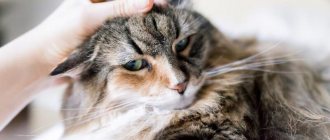Why does a cat lie on its chest? Cat home doctor
Cats seem to be aware of their role and know who needs attention or affection - it's their sixth sense.
Our furry pets have the wonderful ability to normalize human energy metabolism. They love warmth very much and are good at distinguishing temperature differences of even half a degree, so if, for example, your knee is inflamed and painful, she will gladly lie with her warm belly on the inflamed joint. Living warmth is very effective in soothing this type of pain, and both you and your cat will be happy. So we can say about any cat that it is a “medicinal breed”.
If you want to always be healthy, then take a close look at your cat’s behavior. If your cat often clings to you, lies on your chest or legs, then you may be at risk of exacerbation of a chronic disease.
The cat treats you when it pulls or licks your ear - after all, there are many acupuncture points on the auricle. By acting on them, a cat can even prevent a heart attack or a nervous breakdown.
If you feel tired and lacking vital energy, then you definitely need to get a cat and take it into your arms more often. Moreover, it is better to do this after the cat has slept and gained strength.
If you often experience irritability and cannot calm down, then this indicates an excess of energy. And this leads to neurasthenia, kidney and heart failure, arthritis and hypotension. In this case, a sleepy cat will help you - keep it on your lap more often and you will forget about such problems.
For those who are bothered by hypertension and osteochondrosis, a “cat collar” will come to the rescue - place the cat on your neck and let it stay on it for 3-4 minutes. Do this often and you will immediately feel relief.
Pets have a harmonizing property, they put their owner’s psycho-emotional state in order, but their main effect is unnoticeable, delicate and vital for a person in modern conditions.
The pet is “switched on” to the energy field of the owner and his family and acts in several forms at once: “battery”, energy shield and “fuse”.
There is a constant and powerful exchange of subtle energies between living organisms. The result is almost always positive and very beneficial to the person. Unfortunately, the animals themselves often fall ill with approximately the same ailments that their owners suffer.
If a cat sleeps on the owner's bed, whether this is a sign, everyone decides for themselves
There are people who believe in omens, there are others - ultimately, this is a matter for the owner. Optimists recommend believing only in good omens and not paying attention to others. It may very well be that they are right. After all, suggestion, like self-hypnosis, is a huge power, and therefore it is better to convince yourself that everything in life happens for the better.
The ancient Slavs believed that if you allow a cat to sleep in the same bed with you, then the owners will definitely have frogs in their heads. Nowadays such a statement is unlikely to scare anyone, but before they believed it and drove the fluffies away.
There is a category of people who do not allow cats to sleep with them in bed due to hygiene requirements. But you can monitor the health and cleanliness of the animal as if it were your own. Experts warn about only one thing: those pets that walk outside will always be potentially dangerous.
Cats should not be allowed to sleep with small children either - they may develop an allergy to these animals due to too close contact.
What are they afraid of?
Why does such a problem appear before the birth of a child: cats and newborn children. There are several reasons :
- possible allergy to cat fur; according to statistics, this pathology occurs quite rarely, but if such a situation arises, the animal can always be isolated;
- a cat can become a spreader of infection, but only if it lives both at home and outside.
The last one is very significant. There is a common belief that cats should be allowed outside. But this is not so, because this is a domestic animal for which the territory that it controls is important, in this case, this is the area of the apartment or house. Side factors that encourage a cat to go outside can easily be overcome: by sterilization, at least of the cat, and drug intervention (sedative drops) for the cat.
This procedure is completely painless for a cat, and for a person’s conscience it is absolutely calm, since, having taken an animal to live in a house, we are obliged to fulfill some formalities, otherwise it is better not to take responsibility for the animal.
If we can’t arrange a cat’s life, then why are we trying to have a child? Communication between a cat and a newborn is inevitable after the baby appears in the house. These creatures are very curious, and having become members of the family, they are also jealous, so you need to prepare your pet for the arrival of a new resident of the house.
Unexpected aggression
Cats can be dangerous for the owner even if they behave aggressively. But, as a rule, cats never attack just like that. This is due to either illness or improper interaction between the cat and the person.
“In most cases, aggression in cats occurs due to fear, which is a consequence of a stressful situation. For example, if you stepped on a cat’s tail, it got scared, hissed, and when you tried to calm it down, it attacked. The stronger the fear, the stronger the aggression, the more serious the injuries it can cause. The best thing we can do in such a situation is to leave the cat alone, give it time to calm down and come to its senses,” explained zoopsychologist, felinologist, veterinarian, and cat behavior correction specialist Elena Melnikova.
Article on the topic
Is it possible to sleep in the same bed with a cat?
Aggression can also be associated with protection of offspring, pain or play habits.
“A cat can protect her offspring and, if a person reaches out to her kittens, attack him. This reaction is due to the release of oxytocin. Aggression can occur when we pet a cat against its will. And this is not always obvious to the owner. The cat can come to him to lie next to him on the sofa. The owner will begin to stroke, and the cat will begin to bite in response. It's like if we went to a cafe with a young man and he started kissing. We just wanted to chat, we weren’t ready for intimate touches, so we reacted negatively. Cats are very self-sufficient and watch their boundaries. They do not like stroking from strangers and have a certain limit of touching even from their owner. Sometimes aggression is associated with pain. For example, an older animal may have pain in the joints, back or head. It may have difficulty seeing and begin to bite if it is suddenly and unexpectedly touched or picked up. Occasionally, the causes of aggression are diseases of the thyroid gland (hypothyroidism), types of epilepsy or brain tumors. “Play” aggression is often encountered: a cat has been taught since childhood to play with its arms and legs, and it perceives them as a toy and hunts for them. To prevent this, you need to play with animals with teaser rods and provide them with sufficient physical activity,” said Lyudmila Konikova.
Through the eyes of a cat and the eyes of a child
Animal psychologists name three main reasons why small children and cats cannot find a common language: fear, jealousy and defense of territory. Whatever the reason for starting a military campaign, the basis for solving the problem should be love and patience, even if the cat attacked the child for no apparent reason or the child hit the cat, seemingly for no reason. However, it is important to get to the root cause in order to know in which direction to move.
- Fear
Understanding why cats are afraid of children is not that difficult. Babies are noisy, fussy, unpredictable and eccentric creatures. The cat loves peace and quiet, values privacy and respects boundaries when communicating. Not every pet is happy when a stranger wants to pat her behind the ear. What can we say about a child who, despite all the signals given, stubbornly refuses to back down! If a domestic cat bit a child, most likely, before taking extreme measures, she made it clear for a long time and persistently that she did not need close contact: she flattened her ears, bristled her whiskers, sparkled her eyes and beat her tail on the floor. But any patience comes to an end, and the teeth begin to enter.
The baby, having first “become acquainted” with teeth or claws, remembers the lesson for a long time. Now the cat is not a funny soft toy with batteries, but something evil and dangerous, capable of causing pain. In some cases, the child deliberately torments the cat, taking revenge on her for her reluctance to communicate and remembering the bite or scratches. This is the case when fear takes an aggressive form: the best defense is attack. This also includes a defensive reaction when a child hits a cat with a bucket just because it is approaching him. Perhaps the pet is interested in the squeaker or wants affection, but once upon a time a cat scratched the child, and he remembers it very well. In this case, it is important to explain to the child why the cat is attacking. Talk about the pain that the baby causes with careless movements. Be sure to explain that the cat is also a member of the family, that we love it too, since it protects our house from arrogant mice who would certainly take away your candies and toys if it were not for the cat. And she is very brave and strong: “Do you remember how painful it was when she scratched you? Not a single mouse will pass!
- Jealousy
Kids quickly get used to the fact that everyone, from their mother to an unfamiliar aunt from the store, is delighted and touched by them. And then suddenly some cat dared to show her claws! It’s both scary and offensive - we need to show her who’s boss. In turn, a cat, accustomed to attention, feels abandoned when a child appears in the house. This means you need to drive out your competitor. This is the case when a cat in the house and a child can live in peace if adult family members find time to communicate on equal terms with both the baby and the pet. Joint games and natural science “lessons” for the child help: “Look how high the cat can jump! Do you know why she needs a mustache and a tail? Do you know why she has such amazing eyes?” Replacing jealousy with lively curiosity is a great option.
- Territory defense
One of the reasons why a cat hisses at a child is to defend its territory. While the baby spends all the time in the cradle or in the arms of the mother, the cat is calm and does not perceive him as a competitor. But when the child begins to crawl, grab her “prey,” touch bowls and crawl into her favorite house, it’s time to act. The cat begins to educate the baby, showing him that some objects and places are her property.
Often a kitten and a child in the house fight over the baby's toys. Not all children know how to share and not everyone easily agrees to have a cat lie on their bed, take their favorite toys with its teeth and lie on the lap of their beloved mother. In this case, there are two decisions: everything is shared or yours and mine. The first option is simpler: we arrange joint games, under supervision we allow the baby to touch what the cat considers to be its property, teaching it to calmly react to intrusion. The second option: show the child what belongs to the cat and explain that it should never be touched (bowls, toys, bedding, etc.). The difficulty is that it is almost impossible to teach a cat not to react to children’s toys, so it is better to educate from the position of “don’t be greedy.” Universal advice without reference to the reason for the “confrontation”: in order for the baby to change his anger to mercy, shift some of the caring responsibilities to him cat Explain that he is already big and almost completely grown up, that the cat needs his support and care: “let’s pour water for Bead, let’s feed him, let’s brush his hair.” Together you can make a toy for your pet or sew her a warm mattress. The child, feeling strong, responsible and grown-up, perceives the cat as a creature that needs to be protected and protected, and therefore treated with care and attention. In order for the cat to react more calmly to the child, you need to control the baby’s actions. In addition, it is important to provide peace for the cat by installing a house somewhere higher where the child cannot reach. Punishments will make the situation worse, so it is important to be patient when disciplining a mustachioed aggressor without physical force.
Cannibalism
It is extremely rare for cats to become cannibals. From time to time, police find bodies of people, mostly pensioners, gnawed by pets in apartments. As a rule, the owners die of old age or illness, and cats, being locked up for a long time, hungry, begin to eat their former owners.
“Animals do not connect the corpse and the owner. They are hungry and eat available food. A cat cannot kill a healthy person. Wild animals become cannibals if they are sick or crippled. This applies to lions, tigers, leopards or crank bears. Wolves, pigs and sharks often turned into cannibals precisely during wars and epidemics, when they tried the meat of corpses. A domestic cat in nature feeds only on prey that it can kill itself. She doesn’t eat carrion and will devour a corpse only out of despair,” says animal engineer Anastasia Kalinina.
Article on the topic
Mur-mur - and you are healthy! Will cats help in the fight against coronavirus?
This behavior of cats does not exclude their ability to become attached to their owners. Pets have long been domesticated and love human company.
Why cats love to sleep with small children
Cats, in general, are affectionate animals and for the most part love to sleep cuddled up to someone. This is how they show their location and affection for the owner. And esotericists also claim that a furry pet sleeps on a person in order to absorb his negative energy, relieve fatigue or an incipient illness.
Cats often like to sleep cuddled up to their owner - this is how they show their affection.
Sleeping next to a small child attracts the cat even more. And there are several reasons for this:
- The babies are always warm and smell very pleasant, in particular, of milk, which cats love so much.
- If an adult can drive away a cat, then the child will not do this; on the contrary, he will most likely hug the animal, press it to himself, and stroke it.
- The cat understands that the child is small, he seems to be taking care of him, taking on the role of his protector, educator.
How to choose a cat for a child
If you choose a small kitten, choose friendly, non-aggressive breeds or outbred animals. But if you want to place an adult pet with you, focus on its personality and established character.
Find out where the cat lived before. If she lived in a family with children, she already knows a lot. If she was in a shelter all the time, was homeless, or lived with an elderly owner, it will be more difficult for her to get used to communicating with children.
At the shelter you can find an adult, well-bred cat that will be suitable for living with children.
When choosing a shelter pet, look for cats that feel comfortable and confident. They are already accustomed to loud screams and constant fuss; the noise and voices of children will not frighten them. If possible, walk down the corridor of the shelter and see which animal interests you. At this moment, not only do you choose, but you are also chosen.
See how cats react to your attention and desire to pet. Those individuals that respond with aggression and try to bite and scratch are not suitable for living with children. A good feature of a cat is that it will react calmly if you pick it up.
Read also: Pastel colors in the Domfront interior
Tell your children about animal shelters and why pets end up there.
Once you decide, introduce your pet to the children. Pay attention to the reaction of both sides. If the cat is wary and takes a defensive pose, it is unlikely that he will be a good friend for children. If he is careful but not aggressive, he will most likely get along with them. The best development of events is when the cat becomes interested in the kids and wants their attention.
When visiting a shelter, ask children to be quiet and not to frighten the pet so that it can approach and meet potential owners without obstacles or fear.
Signs about cats sleeping in public
Cats spend most of their lives sleeping. On average, they sleep about 17 hours a day. It is not surprising that, observing sleeping pets, people came to the conclusion that this phenomenon is connected with events occurring in their lives. This is how many signs were born related to cats sleeping on their owners:
- If an animal lies on the stomach of a girl or woman, she is probably expecting a baby. Some people believe that if you hold a curled up cat near the uterus, you will soon be able to get pregnant.
- A pet that constantly kneads a certain part of the owner’s body with its paws gives the owner a signal that he has some problems with the organs located in this place. If the doctor does not find any health problems during a diagnostic study, for personal peace of mind it is not recommended to ignore the “predictions” of your four-legged pet. In any case, a thorough check of the functioning of the internal organs will not hurt.
- If an animal often sleeps on its neck or next to its head, this is a warning that mental and physical activity should be reduced, otherwise health problems due to overwork cannot be avoided.
Many women expecting the birth of a child become very superstitious. Some expectant mothers believe that if:
- the cat lies down on him or tries to lie down next to him, which means there is a threat to the safety of the fetus;
- If you let your pet breastfeed, the breast milk will soon spoil and the baby will have to be switched to artificial feeding.
To believe or not in these signs is a personal matter for everyone. In any case, you should not rely heavily on them, since it is man who is the master of his destiny and entrusting it to an animal is at least irresponsible, and zealously reject it, because some of them are not without meaning.
Source
Cats are being treated
Doctors say that with some diseases the temperature of human body tissues increases. And the fluffies sense it and lie down right there.
An interesting fact is that cats love to lie on a pregnant woman’s stomach (and the woman may not even know that she is pregnant).
- Cats also like to sleep on their owners' clothes.
Here is my cat recently sitting and sniffing my robe:
Thus, they want to “absorb” the smell of a loved one in order to become closer to him, to become even more related.
Sleep disturbance
Cats love to sleep and do it for a long time. On average, a cat sleeps fifteen out of twenty-four hours. On the one hand, this is good, but on the other, a problem arises. Fluffy pets and humans do not have the same cycles, so when the owner needs to sleep, the animal begins to be active.
Cat lovers know what it’s like to wake up from the night games of an animal or the eternal “tygy-dyk”, which, it seems, is even on the ceiling. But that's not scary either
A playful kitten wants its owner to pay attention to it and begins to wake it up. Claws, voice, paws and tail are used, which the animal puts under its nose
A giant spinosaurus that lived 100 million years ago in North Africa ate fish
Stylish examples from fashion bloggers for women over 50 for the first week of February
They called it differently: why the neighbors were offended by Vladimir Vysotsky’s mother
As a result, a person does not get enough sleep and feels lethargic and drowsy the entire next day. According to surveys, twenty percent of cat lovers agree that sleeping together with an animal does not bring cheerfulness.
Why do cats lie on humans?
Representatives of the cat family have lived among people for thousands of years, but it is still difficult to understand them. No one can explain exactly why pets love to sleep in the company of their owners, choosing a person’s head, stomach or back as a bed. There are only different theories and assumptions on this matter.
Scientific hypotheses
Among zoological scientists, a large group consists of those who study the causes of animal behavior in various situations. Experts who observe their habits give different explanations for the fact that the cat is lying on a person. The most logical ones are the following:
The pet uses the person as a heating pad. Indeed, cats have a normal body temperature that is 2 degrees higher than that of humans. This makes it harder for them to stay warm. A person is the warmest place to sleep compared to other “interior items”.
By placing itself on top, the cat shows its superiority. Representatives of the cat family have historically been predators. In this regard, even domesticated animals want to feel like leaders in a pack. Lying on top, the fluffy one controls the territory of the house and its inhabitants.
The pet wants to feel safe. Positioned on a person, it seeks to relax and find protection.
The mustache is attracted to the smell emanating from the owner. Scientists have suggested that human sweat is a kind of aphrodisiac for furry cats. This is why some cats fall asleep with their nose buried in people's armpits.
Calms the heartbeat of a kitten or adult. Lying on top of their chest, they fall asleep to the hypnotic rhythm. Little kittens want to sit on a person to remember and feel their mother’s heartbeat.
Despite the fact that no hypothesis is 100% proven, the explanations seem logical. You can observe your mustachioed friend yourself and confirm the scientists’ guesses.
Owner's observations
Many breeders believe that pet fluffies love to sleep on a person simply because it is comfortable. Others talk about the affection and love of a mustachioed friend for a person. But the most attentive people have long noticed a certain pattern in the desire to lie on a person - they call the reason for this desire a lack of communication and attention. The animal purrs and lies down next to or on a person because it needs close contact.
It has been noticed that the longer a pet is left alone, the more stress it experiences. By laying down on a person, the mustache tries to compensate for the time it spent without communication.
On the other hand, by its behavior the pet shows a desire to alleviate suffering. Owners often talk about the cat’s desire to lie on the part that hurts or aches. Placed on the back, chest or legs, the fluffies begin to purr and massage the problem area with their paws. Thanks to this, the discomfort experienced by the owner is reduced.
In addition, furry homebodies have a desire to protect a loved one. Like dogs, felines have a bold character and strive to dominate. Therefore, if a cat lies on a person, then he is not just dozing, but protects the house and the people living in it.
A bit of the supernatural
Since ancient times, people have been talking about the supernatural abilities of mustachioed pets. It has been noted that it is the mustaches that find out about the mistress’s pregnancy before anyone else. They take protection of the unborn child and the expectant mother, positioning themselves on her stomach.
It is believed that the powerful energy of pets has a positive effect on weather-sensitive people. Thus, a cat can normalize the owner’s blood pressure or eliminate a migraine if it lies on top of its head.
Many believe that pets have extrasensory abilities, sense negative changes in the human biofield and strive to neutralize their negative effects. Lying in the area of the solar plexus, murkies thereby improve the owner’s mood, relieve stress, relieve depression and seasonal blues.
Beliefs attribute the greatest supernatural and healing powers to white cats. Black representatives are endowed by popular rumor with the ability to take away negative energy. Saffron milk caps are considered an excellent source of strength - they are ready to convey to a person their positivity, cheerfulness and good mood. Gray fluffies, on the contrary, give peace and tranquility.
Does it matter what parts of the human body a cat lays on?
Trying to fit more comfortably on the owner’s body, the cat does not always care about its comfort, but worries about the human’s health and tries to point out the problem. In the old days, it was believed that a mustachioed friend would lay down precisely on the part where there was already painful sensations or where pain would soon appear.
Indeed, there are patterns in why a pet is located in a certain place:
When the fluffy lays down on his feet, it’s worth thinking about the health of his joints or veins. If there are no problems with the limbs, then the mustachioed doctor is simply trying to relieve the fatigue and tension that has accumulated during the working day.
If a cat lies down on a person, choosing its head as a “bed,” this may indicate the owner’s weather sensitivity. The pet seeks to alleviate a person’s condition, relieve headaches, influence high blood pressure, and relieve tension.
If your pet stomps and then lies down on its chest, this may be a signal of problems with the cardiovascular system. By choosing the left side of the chest as a bed, the mustache tries to alleviate suffering, relieve tension and normalize the heartbeat.
We must remember that the cat most often chooses one family member as a sleep partner, whom he cares for and protects. Therefore, observing the behavioral characteristics of a fluffy and his desire to lie on another person gives another reason to think about his state of health.
Is it possible to sleep with a cat? And what is the danger?
The danger may not always be visible; often our pets can pose a passive threat to us, which we may simply not notice or not attach importance to.
As established by modern medicine, more than 250 diseases in the world can be transmitted to humans from animals. Cats are carriers of approximately 100 of these diseases, which are transmitted even during normal time spent together.
And if you sleep with your pet in the same bed, the risk of getting sick increases, especially since during sleep a person is more susceptible to various infections.
There are still reasons why you shouldn't invite your pet into bed. And this is not just any disease.
Video: https://klopik.com/uploads/posts/2018-08/1534608865_thikgwdsh60.jpg
Biologist and electronics engineer Vicki Warren is against sleeping in the same bed with pets. She considers cats to be an antenna for the natural radioactive background of the earth. Consequently, when sleeping together with a cat, a person becomes a magnet for radiation. The dose of radiation is not lethal and you cannot get seriously ill because of it, but discomfort and illness may occur as the radioactive background increases. The result is lack of sleep and lethargy in the morning, and in the long term, a negative impact on health.
A panel from the Sleep Academy in Pittsburgh, based on research, claims that nighttime restlessness in animals can be harmful to humans. Pets sleep a lot during the day and are sensitive to what is happening around them even when half asleep
One awkward movement and the cat is ready to play or hunt, which means it will wake up the owner so that he pays attention to him. Also, cats move from place to place several times during the night, which makes the owner’s sleep tiring and deprives him of a full night’s rest.
When should you not sleep with a cat?
If you love your pet so much that you can't resist sleeping in the same bed, it's important to know how to prevent and eliminate potential threats:
The animal must be completely healthy, vaccinated and treated for parasites. If a cat likes to walk the streets, you should not share the same bed with it. All bacteria and germs will end up in your bed. Expectant mothers are also not recommended to sleep with pets - there are diseases in cats that can harm the development of the fetus. Cats can be a source of allergies, which can be greatly aggravated if the animal sleeps nearby. To make the animal bother you less at night, you can prepare your pet for bed - you need to feed the cat, play with it so that all the excess energy goes away. Provide your animal with access to a tray and water so that he doesn't wake you up at night. And it is better if the door to the bedroom is open so that the pet can freely leave the bed. Sleeping with animals is contraindicated for children under 5 years of age.
Particular attention should be paid to the presence of a pet in the house if there is an infant. A cat can become a source of danger even when awake, for example, leaning against a baby and accidentally suffocating him. If your cat is sleeping, don't wake it up abruptly.
She may perceive this as danger, and therefore may bite or scratch you.
Photo: https://estaticos.muymascotas.es/uploads/images/gallery/58e625825bafe819bc8b4567/mujer-durmiendo-gato.jpg
For many people, cats help cope with insomnia and depression. With their pleasant purring, they seem to lull the owner and warm him on cold evenings.
Sleeping with your favorite pet will be much more enjoyable if you take precautions when sleeping with it
Previous post: Why was Vishnevsky ointment banned in Russia?
Next entry: Feeding cucumbers with iodine in open ground - advantages, recipe.
Other places where your four-legged pet sleeps
The bed was sorted out. But our pets sometimes choose such strange places to sleep that it’s amazing! Why do they do this?
The cat sleeps on the table
- Mystical explanation. The purr “keeps” someone in the family, promising him illness or death. And if the table is in the kitchen, then the jealous young lady, through her actions, drives the man out of the house.
- Realistic explanation. From a height, the animal has a better view and control of the territory, children won’t reach the cat on the table, and the nearby kitchen is also full of all sorts of tempting smells.
There is no need to be afraid of signs. Remember: according to many beliefs, a cat can sacrifice itself in order to ward off trouble from the house. Well, will she click on her favorite owners? Of course not. However, you still need to wean your pet off the new habit. A table, especially a kitchen table, is a place that must be exceptionally clean. And a sign about a man can work if your husband has to eat food seasoned with cat hair every day.
On the threshold
Legends consider the home threshold to be the brownie's favorite hiding place. And cats are his constant interlocutors and loyal friends. Previously, in Rus' it was believed that the rodent exterminator dozing on the threshold was having a leisurely conversation with the house spirit, so there was no need to disturb them under any circumstances. This is in your own interests!
The pet doesn’t just bask in the sun, it solves important issues!
Are there any problems?
Cat lovers know very well what can happen when the door of a house or any door in an apartment closes. Most likely, the cat will sit by the door and meow until the door opens. The owner thinks that the animal is so bored, so he will allow him to sleep in the same bed with him. In addition, many people like to doze off, feeling the presence of their furry friend nearby, especially pleasant when the cat purrs.
And yet, at some point the question may arise: can this beloved animal, by its constant presence in bed, somehow harm human health?
Coronavirus sharply reduces the level of vitamin A in the body, doctors say
The coronavirus pandemic will not end until 2023, astrologers say
Scientists have named the reason for the increased infectiousness of the “British” strain of coronavirus
This question is truly reasonable. Thanks to an animal, animal dander and garbage may end up in the bedroom, and a person’s sleep may be disturbed. Yes, there may be plenty of problems and worries.
What to remember when falling asleep next to a cat
Owners of furry purrs are unlikely to refuse to fall asleep at least once while stroking their beloved pet. But frequent nighttime spending with a cat in the same bed can result in a number of troubles. Thus, somnologists cite a theory according to which the quality of sleep noticeably deteriorates in those who like to sleep with pets. Because of this, the effectiveness of rest time also decreases. And all because cats by nature are nocturnal animals and can rarely sleep next to their owner until the morning.
Cats may find it difficult to sleep through the night.
Other negative consequences of sleeping together between humans and cats include:
- feeling of discomfort. Since in the middle of the night a cat can begin to purr and trample the owner with its paws, and sometimes bite if the animal does not like the behavior of the breadwinner in a dream;
- violation of hygiene. An animal living in the same house as a person must be free of parasites - helminths and fleas. In addition, the cat must be washed regularly to avoid the risk of Toxoplasma infection. And yet, despite observing all the “rules of cleanliness,” under no circumstances should a pet be allowed to enter a child’s crib;
- the appearance of an allergy to skin particles or animal saliva. Research has shown that the widespread belief that the body has a negative reaction to cat fur has no basis. However, allergies are caused by substances secreted by the endocrine glands of furry animals.
Taking precautions into account, you should take care of creating a warm and soft sleeping place intended for your beloved cat. Perhaps the cozy corner will appeal to the tailed friend and the animal will have fewer reasons to crawl under the blanket with its owner
Development of allergies
How can a mother and baby get enough sleep and manage everything?
Experts say that almost a third of the world's population has allergic reactions to pets. However, allergies to cats are much more common than to dogs. The cause may be not only pet fur, but also particles of excrement, saliva and skin secretions. Allergens entering a child’s body provoke suppression of the immune system, leading to serious health consequences.
Does it make sense to interfere with an animal's habit?
If necessary, you can easily change your pet's established habit. To correct behavior, it is necessary to reconsider the existing sleeping place and daily routine.
Weaning off co-sleeping
If falling asleep together is marred by waking up too early, periodic biting of heels, or constant stress due to the fear of harming the animal by accidentally turning around, give it up in favor of your health.
Instead of your own bed, offer an equally tempting place, based on the cat’s basic needs:
- Warm.
Place the bed on the radiator or next to the heater. For added comfort, place a soft blanket inside.
- Security.
Most mustachioed pets prefer closed houses or ordinary cardboard boxes.
- Purity.
Regularly remove accumulated hair and dust from the sleeping area.
- Calm.
Make sure your pet is not disturbed by bright lights or extraneous sounds. Also be sure to place a favorite toy or your T-shirt next to him. Familiar smells will help you relax and get used to an unfamiliar environment much faster.
- The desire to control the situation.
The chosen place should be on a hill so that the cat can always monitor ongoing events from a safe hiding spot.
Getting used to a new place can take a lot of time, so be patient. Do not scold the animal or kick it out of your room. Instead, try to give him more attention by involving him in joint games.
After a hearty dinner, carefully move the cat to the bed and stay next to him until he falls asleep. Repeat this procedure every evening and be sure to praise your pet if he takes the initiative and lies down on his own.
Co-sleeping training
In the opposite situation, it is recommended to follow similar actions. It will help you:
- A large meal and active games before bedtime. Transfer the cat to bed as soon as he is tired and full. Over time, he will get used to your schedule and will even push you if you are late watching an overly exciting movie.
- Using your favorite bedding or house. Place them in the bedroom, and then right on the bed, luring the furry one into your arms.
- Catnip smell on bedding.
- Minor redevelopment. Place the bed close to the radiator to attract the cat with warmth.
- Strengthening your relationship with your pet. Mustache will only sleep with someone he trusts, so try to win him over with your love.
Stop any games on the bed and do not succumb to the nightly provocations of a hungry glutton. Your inflexibility will help the animal understand that the bedroom is strictly for relaxation, which means that he will have to come to terms with your regime.
Conclusion
If a cat lies at your feet, then he unconditionally loves and appreciates you. Don't drive him away and demonstrate reciprocal feelings. Thanks to a comfortable psychological environment, your pet will grow up docile and good-natured - and will definitely delight you with its healing purring at any time of the day.
The article is a recommendation!
What are the risks and benefits of a child living under the same roof as a cat?
A cat that receives regular care cannot be a risk factor for your child's health. Be sure to check your cat for fleas before your newborn arrives, but don't panic if you find them—the fleas that live on cats are not transferable to humans and are easily treated. Be sure to vaccinate your children according to the schedule; when playing together, little family members can be scratched, and any violation of the integrity of the skin is a risk for an unvaccinated child. We cannot fail to mention the potential benefits of children and cats living together. According to recent studies, children growing up with cats reduce the risk of certain types of allergies, as well as asthma.
Is it possible to let a cat into a baby's crib?
However, the indicated situation only at first glance seems idyll. In fact, doctors warn parents to allow small children to sleep with cats, and in the case of an infant, this is simply unacceptable. The danger is as follows:
- A cat weighs on average 5 kg (for comparison, a child, for example, at six months has an approximate weight of 7 kg). She can climb onto his face or chest and simply crush him with her body.
- The immune system of a small child is still imperfect. Therefore, he turns out to be vulnerable to a lot of pathogens that cats carry (a child can become infected with toxoplasmosis, lichen, worms, etc.).
- If something alarms or frightens the cat (for example, the loud crying of a baby), it may bite or scratch its little owner. And this is a lot of stress for him and, again, a way of transmitting infection. In addition, children often move their legs under the blanket at night: the cat may mistake this for play and claw the baby.
- Cats are predators by nature: they sleep a lot during the day and are quite active at night. In a crib, the pet will not sleep peacefully all night, will change body position, and move from place to place. As a result, the child will not get enough sleep, after waking up he may be capricious and lethargic.
Video: Doctor Komarovsky about whether pets are dangerous for children
As you know, cats are very capricious creatures that walk “on their own.” But if there is a small child in the house, you need to limit the pet’s desires and not allow him to settle down in a crib at night, or even during the day. After all, we are talking about the baby’s health, which cannot be risked.
Preparation
Cats are quite tolerant of newborn children if you prepare them in advance for the arrival of a new member of the community that lives in this house or apartment. To do this, you need to take the following preventive measures :
- for a cat, one of the main stresses is noise, which is inevitably associated with the appearance of a newborn baby in the house, so you need to accustom the animal in advance to these loud sounds that a baby makes when inviting friends who have small children home;
- accustom your pet to the sounds of a rattle, give the opportunity to smell those substances and objects that will be associated with the child: powder, baby cream, lotion, shampoo, cats receive almost half of the information through smell;
- You need to talk with your pet about future changes, naming the name of the future child, if it has already been chosen.
If a cat sleeps at the head of the owner, what does this mean?
Experts have conducted a number of studies and found that a cat can sleep near its owner's head for several reasons.
According to physiological
The human head is always warm, and therefore the animal is very comfortable there. The location of the cat near another part of the body may indicate that it is hot there and perhaps there is an inflammatory process leading to this. The cat will experience the same comfort when lying on a battery or on a laptop.
In a dream, a person does not swing his head, but a cat has most likely already gotten his foot or hand accidentally, so the animal could remember that he can sleep peacefully near his owner’s head.
Emotionally
An emotional connection between the owner and the cat can occur if they are very attached to each other. Then the location of the cat in the area of the owner’s head indicates that she adores him.
According to energy
As for human energy, a cat is able to detect the slightest fluctuation. It is for this reason that it will settle down in the place where the most negativity has accumulated. The animal will take on the entire burden of problems (although no - only part of the load, which the cat must then process and then return again for the rest of the negativity).
According to popular belief, the place where the cat lies down is not just that. If the place is always the same, this signals the development of pathology in the area where the cat is located. Constantly settling above the head is a signal of the owner’s chronic fatigue, increased nervousness, frequent headaches and disruptions in cerebral circulation.
Difficult to retrain
Pets sooner or later develop habits and sometimes it is very difficult to retrain them. This is especially true for cats; they adapt very poorly to external changes. If you suddenly decide that you no longer want to sleep with your pet, then the animal's behavior is unpredictable. The cat may scratch the furniture and start marking its territory.
Veterinarians advise first to please the cat with something new, to switch its attention. For example, a new toy or a special tree on which the animal can play will do.
When the furry one is busy doing something interesting, he will not want to go to war with you.
Are cats dangerous for small children?
A well-trained and socialized cat is no more dangerous to your child than an older sibling of a similar age, and may even be less dangerous! However, just as you would not leave 2 small children together alone for a long time, the communication between a cat and a child needs your supervision. This also applies to sleep, since if a pet sleeps with a newborn, it can cause difficulty in the baby’s breathing, as can also be caused by poorly placed plush toys, towels, etc.
Read also: How to say hello in different countries of the world?
Even if your cat is aggressive, remember that a newborn is unlikely to cause aggression in your furry friend, since he is inactive and in the eyes of a purr does not pose a particular danger. However, in order to be completely sure that unpleasant incidents will not occur, it is best to consult with an animal psychologist before the child arrives at home.
Remember: Tens of millions of children are growing up under the same roof as cats all over the world! As recent studies have proven, children who grew up under the same roof with cats are healthier and less likely to suffer from allergies than children who did not have animals.
Conclusions, generalizations
Many people believe omens to this day, because they were compiled over the years, through observation and collection of information. Some of the popular beliefs are current, while others are on the verge of insanity. Quite a large number of signs are associated with pregnancy and childbirth. The basis of any popular belief was fear of the unknown, and the process of pregnancy and childbirth has not been fully studied to this day.
Scientists and doctors support many signs associated with contacts between cats and pregnant women. There is no clear certainty about what our ancestors were thinking when they said that a pregnant woman should not play with cats, have less contact with them and not clean up their waste products. But it is better to observe all these provisions, because cats are carriers of such a serious disease as toxoplasmosis. This disease in an adult is asymptomatic and does not threaten him in any way, but it poses a very strong threat to the body of a pregnant woman. Its ability to penetrate the placenta can provoke the appearance of various pathologies in the development of organ systems in the unborn child.
Other signs that say that you should not stroke cats with your feet, because this is fraught with nervous disorders, frankly, look like nonsense. In defense of cats, I would still like to note that a woman develops immunity to toxoplasmosis if she has an animal living in her house for several years. And then, not every individual survives the disease. If this is a domestic cat that has been provided with the necessary care, does not walk outside, has received all the necessary vaccinations and is regularly prevented from helminthic infestations, then there is nothing to worry about, such an animal does not pose any danger at all and there is no need to throw it out into the street.
Allergies are a completely different matter. For example, if you consider the sign that you cannot kick a calico cat out of the house if the woman is pregnant, otherwise the baby will not survive. Very often, pregnant women become allergic to the fur and epidermis of their own pet, who has lived with her in the apartment for a long time. This is due to hormonal changes, many years of sensitization of the body to allergens and a decrease in the body’s protective functions. In this case, no matter what the cat is, it must be given away as soon as possible, otherwise the risk that the child will be born with an allergy increases.
There is only one conclusion: if you want to be able to believe in omens, no one forbids you from doing so. But first of all, you need to think about whether this really shouldn’t be done or whether someone came up with such a belief so that a person would not try to find out what he is not supposed to. For example, in order to intimidate expectant mothers, they said that they should not determine the gender of children in advance and buy things for children. But, if you think about it, what will a woman dress her baby in after giving birth if she doesn’t buy him clothes? Every person believes in what it is convenient for him to believe.
How to organize safe coexistence of a baby with animals?
The doctor will help identify any problems, suggest a remedy for regular deworming and give the necessary vaccinations. This procedure is necessary to reduce the risk of infecting the newborn with diseases that your pets can carry.
- After the birth of a child, do not scold or punish the dog in his presence under any circumstances, so that the animal does not develop negative associations with the new family member.
On the contrary, the pet should be petted and praised when the baby is nearby. In this way, the animal will develop the correct attitude towards the baby.
Even the most affectionate cat or the most obedient dog can involuntarily push the baby, press him with his paw or the weight of his whole body. It is advisable to keep pets out of the nursery at first to minimize the risk.
- Do wet cleaning every day.
Once your baby learns to crawl, he will invariably want to taste the fur that your shedding cat leaves all over the house. The cat litter box will be of no less interest to the baby, so it will need to be cleaned regularly to prevent the baby from coming into contact with feces. You will have to wash the floor more thoroughly if you are walking your dog outside. On its paws, your pet can bring home many bacteria, contact of which with the newborn should be minimized.
- Your pet should not come into contact with the baby's toys and clothes.
If this does happen, thoroughly wash the toys and wash the items. And, of course, do not forget to wash your hands after playing with the animal, before turning your attention to the baby.










